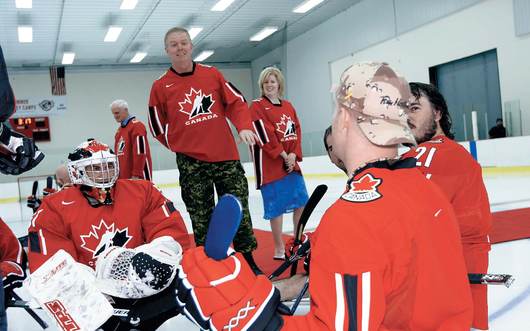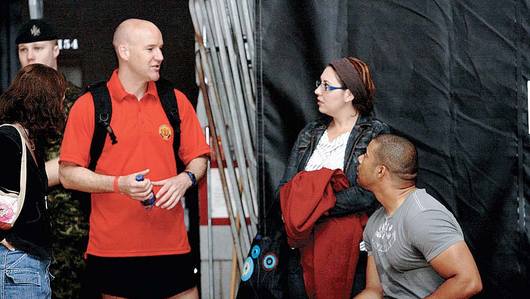Veterans benefit from a new partnership with the Canadian Paralympic Committee

When Sergeant Andrew McLean holds the beret he kept from serving in the 1st Battalion of the Royal Canadian Regiment, he feels something stir within him. The Air Force search-and-rescue technician’s memories of the Army come rushing back, with a sadness that is strangely motivating. Instead of dwelling on the friends and colleagues who have been killed or injured in Afghanistan or during search-and-rescue missions in Canada, Sgt McLean does the only thing he can to make sense of his feelings – he runs. He runs and runs and runs, until the sweat and adrenaline and the force of his six-foot, 186-pound frame on the pavement remind him how lucky he is to be alive.
And with that sense of gratitude comes a responsibility, says the championship ultra marathon runner, to make his running count for something, and to draw attention to something bigger than himself – the work of the Canadian Forces and the sacrifices being made by members overseas and at home.

“When I was in the Army, I learned about duty and selflessness, and the idea of mission before self,” says Sgt McLean. “When I run, I think about that. I want people to see the confidence and professionalism we have as members of the Canadian Forces, and that Canadians can count on us to take care of them, or others around the world. I also want them to see that we take care of our own members when they return from a place like Afghanistan injured or in need of rehabilitation.”
Sgt McLean has taken his passion for rehabilitating injured Canadian soldiers to a higher level, which he could only dream about a year ago. As part of its morale and welfare programs, the Canadian Forces Personnel Support Agency has launched a new program in partnership with the Canadian Paralympic Committee (CPC). The program, CF Soldier On, was co-founded in 2007 by Sgt McLean and the CPC to support sailors, soldiers, airmen and airwomen, both serving and retired, and their eligible dependents with a physical or mental disability to fully participate in physical recreation and sports. The program will promote and support the return to military service or transition to civilian life.
While the program is being hailed as innovative, the idea of rehabilitating injured soldiers through sport isn’t new. In fact, it dates back to 1944. With the Second World War still raging, the British government asked Sir Ludwig Guttmann, a neurosurgeon who fled Nazi Germany, to manage a rehabilitation centre for people with spinal cord injuries at Stoke Mandeville Hospital in Aylesbury, England. Guttman, a strong advocate of using sport as a vehicle to restore not only physical strength but also mental health, self-confidence, dignity and comradeship, introduced sport as part of his clinical treatment program.
Then there was Second World War flying ace Douglas Bader. After losing his legs in a flying accident in 1931, the Royal Air Force pilot wasn’t expected to live, let alone fly again. But, the determined 21-year-old convinced his superiors to let him fight, and he went on to shoot down 22 enemy aircraft, a feat for which he received the Distinguished Flying Cross. Bader was shot down and taken captive in 1941. After spending most of the war in a German POW camp, he was released, and he left the Royal Air Force in 1946. Thirty years later, he was knighted for his devotion to rehabilitating British amputees.
It was through the experiences of visionaries like Bader and Guttman that the world came to see that amputation is not the end of the road for active individuals. Following the Second World War, society in general began to recognize the need for advanced and improved medical and rehabilitation techniques for people with disabilities. The medical practices of physiatry and physiotherapy emerged as reputable forms of medical treatment.
The success of using sport as a remedial exercise and clinical treatment for wounded soldiers, including some of the 55,000 Canadians injured during the Second World War, inspired Guttmann to organize an international sporting competition. The first International Wheelchair Games was held in 1948, coinciding with the London Olympics. Guttman’s dream was to create a worldwide sports competition for people with disabilities to be held every four years as “the equivalent of the Olympic Games.” Twelve years later, his dream became a reality when Rome hosted the first Paralympic Summer Games with more than 400 athletes from 23 countries.
Today, some 60 years later, the Canadian Forces is reconnecting with the Paralympic movement through CF Soldier On. The Canadian Forces hopes to incorporate this and other programs into a much larger, more comprehensive program to integrate sport and rehabilitation.
“The contributions of the Paralympic movement to improving the quality of life of all people with disabilities and to promoting and supporting freedom, world peace and human rights are undeniable,” says Greg Lagacé, manager of CF Soldier On. “These are the same values espoused by the Canadian Forces. This vibrant and ever-growing global movement continues to make tremendous contributions, and Canada has been a leader in the Paralympic movement from its early days. These accomplishments should be honoured and preserved considering their military origins and Canada’s strong military history.”
So, with Vancouver hosting the Paralympic Winter Games in 2010 and the Canadian military rehabilitating injured soldiers through sport, the seed has been planted for CF Soldier On to grow much larger. If there is any doubt about the benefits of such a program, one need only ask Master-Corporal Paul Franklin, who became a double above-the-knee amputee after a suicide bomber targeted his vehicle in Afghanistan in January 2006.
MCpl Franklin recently participated in Snowsport Festival 2008, a week of activities for skiers with physical disabilities at Vancouver Island’s Mount Washington Ski Resort, hosted by the Vancouver Island Society for Adaptive Snowsports and funded by CF Soldier On. Without knees, MCpl Franklin feels every bump and jolt directly against his femurs. But he refuses to let the pain hinder his progress – he doesn’t want to live a sedentary lifestyle. “This gives you a sense of ability instead of a sense of disability.”
There’s another reason MCpl Franklin went to Mount Washington. Before his accident, he could often be found skateboarding through his neighbourhood with his son Simon. Now he hopes to someday snowboard with him. “He’s my biggest motivator, he’s always been my focus,” MCpl Franklin says of his son. “I never thought I’d be back on a mountain, doing things that are highly physical. But that’s the true essence of rehabilitation. I have choices now.”
Master Seaman Eric Payne, an avid adaptive skier, agrees. The last time he’d felt speed like what he experienced while skiing was when he’d been on his motorcycle, riding the backstreets around Greenwood, Nova Scotia. A head-on collision with a truck cost him a leg and changed his life forever.
Fourteen operations and three years of painful recovery later, MS Payne is rocketing down the slopes, a tiny outrigger ski in each hand, a regular ski on his leg. Close behind, his ski instructor is wishing Payne would slow down a little, but he doesn’t stop until he runs out of hill.
“It’s all about quality of life,” MS Payne says afterwards, a huge grin spreading across his ruddy cheeks. “Before the accident, I had skied all around the world. I want to be as active now as I was then. Being active, building endurance, it makes your life so much easier.”
That kind of positive change is what motivates Sgt McLean to stay involved with CF Soldier On and work with the Canadian Forces to see it evolve. Sgt McLean recently received the King Clancy Award from the Canadian Foundation for Physically Disabled Persons for his work with the program.
“There were no words to describe how I felt at receiving that award,” says Sgt McLean, who has big dreams for the program. His ultimate vision includes firefighters, police officers and paramedics with disabilities, and eventually he’d like there to be a national rehabilitation centre with a strong emphasis on adaptive sports and active lifestyles.
To learn more about CF Soldier On, please visit www.CFSoldierOn.ca
With files from Captain Jeff Manney and Joel Wiebe.














